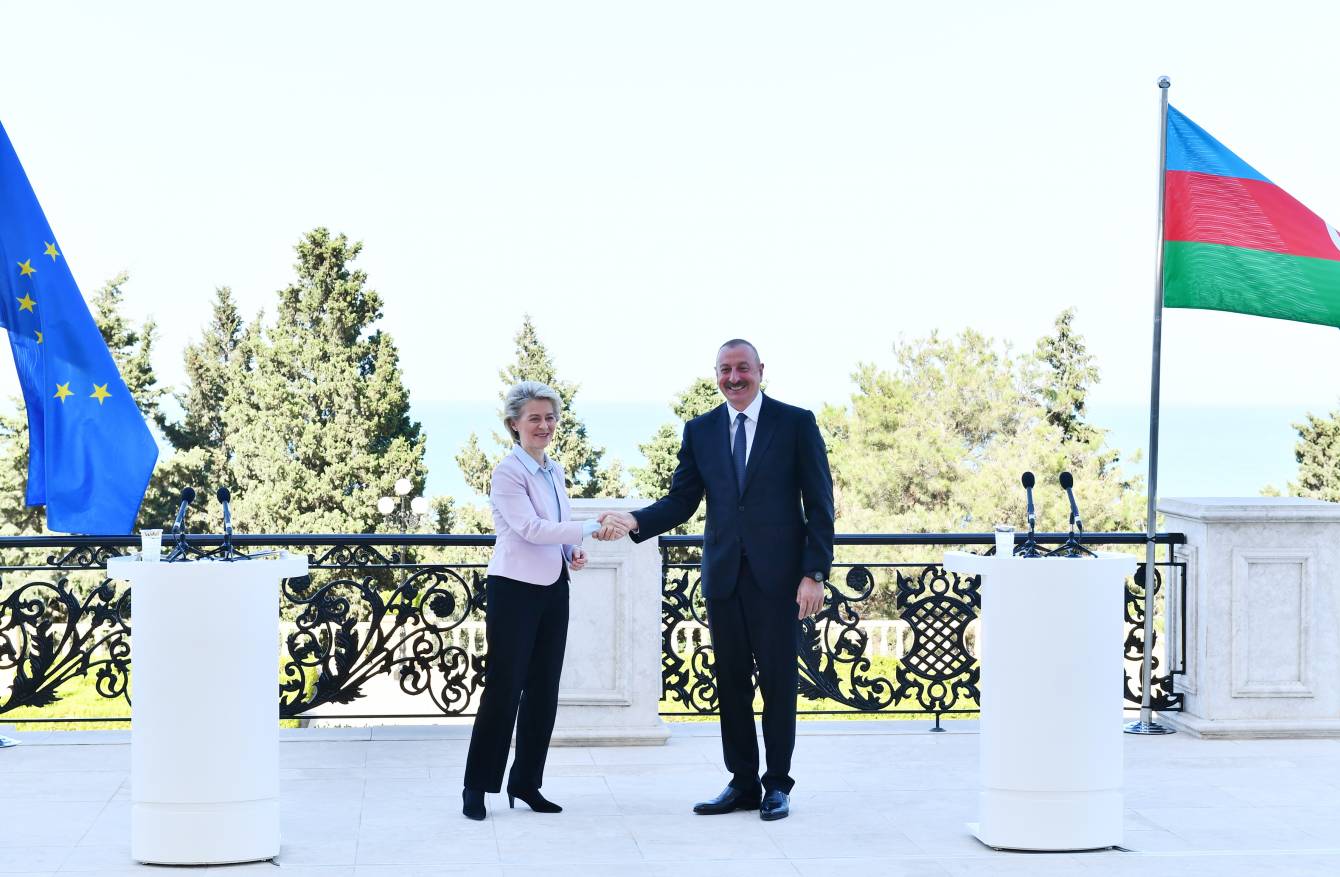Azerbaijan and the European Union signed Monday a Memorandum of Understanding (MoU) on the strategic partnership in the field of energy.
The document was signed by Azerbaijan’s President Ilham Aliyev and European Commission President Ursula von der Leyen as part of the latter’s visit to Baku.
While addressing a joint press briefing, President Aliyev explained the newly signed document came as a result of the 15-year-long active energy cooperation between the sides. The document followed the previous strategic partnership agreement signed in 2006 and Joint Declaration on Southern Gas Corridor signed in 2011.
“We have a good history and good achievements. Energy projects initiated by Azerbaijan and supported by European Union and supported by our partners completely changed the energy map of Europe,” President Aliyev said after the signing ceremony.
“We started with oil production, and then gas production, and construction of oil pipeline which connected Caspian with Black Sea and the Mediterranean. Of course, the Southern Gas Corridor which is 3,500 km long integrated pipeline system which brings our gas to European Continent,” he added.
The Azerbaijani president further said that although the Southern Gas Corridor became fully operational less than two years ago, it has already brought benefits to both sides.
Azerbaijan has been supplying natural gas to Europe via the Trans Adriatic Pipeline (TAP) since December 31, 2020. TAP forms a part of the Southern Gas Corridor (SGC) mega pipeline designed and built for increasing and diversifying European energy supplies. TAP, the final segment of the corridor, starts at the Turkish-Greek border and runs along 773-kilometer onshore and 105-kilometer offshore routes traversing Greece and Albania toward its end destination in Italy.
The three-segmented SGC traverses seven countries and six regulatory systems, links 11 different investors, and supplies 12 different gas buyers, primarily in Europe. The pipeline’s initial 16 billion cubic meters (bcm) annual transportation volume is shared between Türkiye and Europe, which receive 6 bcm and 10 bcm, respectively.
The 3,500-kilometer-long mega pipeline strengthens European energy security, diversifying its energy supplies and boosting decarbonization efforts by providing an uninterrupted flow of Azerbaijani gas. The Southern Gas Corridor, defined as one of the world’s most complex and expensive pipelines built to date, is a unique energy route that carries natural gas from the Caspian Sea reserves directly to the European marketplace. The main source of natural gas for the SGC is Azerbaijan’s offshore Shah Deniz field, with an estimated 1.2 trillion cubic meters of proven reserves.
Currently, the European market accounts for the largest share of daily gas exports from Azerbaijan. European consumers are supplied with about 27 million cubic meters of Azerbaijani gas per day.
Meanwhile, Ursula von der Leyen said Monday that the main source of natural gas imports to Europe, namely supplies from Russia, were no more reliable already before Moscow’s invasion of Ukraine. According to her, the EU decided “to diversify away from Russia and to turn towards more reliable, trustworthy partners.”
“I’m glad to count Azerbaijan among them. You [Azerbaijan] are indeed a crucial energy partner for us and you have always been reliable,” she said at the joint press briefing with President Aliyev.
“The Memorandum of Understanding that we have just signed makes our energy partnership even stronger […] We will double the supply of gas from Azerbaijan to the European Union. Indeed, with this MoU, we commit to the expansion of the Southern Gas Corridor.”
The European Commission president further said that the SGC currently supplies over 8 bcm of gas to the European Union annually, while its capacity will be expanded to 20 bcm in a few years.
According to Leyen, starting in 2023, Azerbaijan will supply 12 bcm of gas to the European Union, which will help compensate for cuts in Russian gas deliveries and contribute significantly to Europe’s security of supplies. By 2027, the total volume of deliveries to the European Union should reach 20 bcm annually.
Earlier, officials in Azerbaijan revealed the country’s intention to put two new gas fields into operation in response to the growing demand for natural gas in global markets. The new reserves are expected to add a significant portion to the current volumes reaching European consumers.
One of the country’s biggest gas condensate fields, dubbed “Absheron,” is expected to be put into operation and produce 1.5 billion cubic meters per year in its first phase. The other big fields with untapped potential are “Babak” with estimated reserves of 400 billion cubic meters and “Umid” with at least 200 billion cubic meters.
Azerbaijani authorities have previously confirmed 2.6 trillion cubic meters of proven natural gas reserves, which they believe can supply foreign partners for the decades to come.







 Armenian sappers commenced on Monday mine-clearance operations in the territories adjacent to the Saint Mary Church in village of Voskepar (Armenia...
Armenian sappers commenced on Monday mine-clearance operations in the territories adjacent to the Saint Mary Church in village of Voskepar (Armenia...
 Iran and Pakistan have signed eight cooperation documents in various fields, and agreed to strengthen ties to fight terrorism in the region.
Iran and Pakistan have signed eight cooperation documents in various fields, and agreed to strengthen ties to fight terrorism in the region.
 President Aliyev emphasized the critical role of the North-South Transport Corridor in fostering transport cooperation between Azerbaijan and Russi...
President Aliyev emphasized the critical role of the North-South Transport Corridor in fostering transport cooperation between Azerbaijan and Russi...



